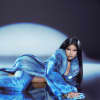Regardless of your opinion on this year's Grammys, one thing is certain: Cardi B was victorious. The BX native began the evening with an infectious presence that commanded instant attention, strutting down the red carpet wearing a dress recalling both Cruella de Vil and Ursula; later that night, she won her first Grammy, taking home Best Rap Album for her record-breaking debut Invasion of Privacy.
All the energy that Cardi brought to the Grammys culminated in her performance of "Money," five fiery minutes of peacock feathers, skin-tight black leopard-print dresses, and one shiny rhinestone-encrusted piano that belongs to Liberace.
Arguably, Cardi's own performance was almost eclipsed by the pianist behind the glittery keys: Chloe Flower, who delivered an absolutely angelic-sounding solo before transitioning into "Money"'s dark, bass-heavy chords. Her fierce piano playing and strikingly confident demeanor added a white-hot spark to Cardi's already hyped performance.
FADER spoke with Flower about how she linked with Cardi B, playing at the Grammys, and how they got that dazzling-ass piano.
How are you feeling just two days removed from the Grammys?
I feel amazing and shocked. I wasn't expecting any of the press that I got. I'm a pianist, so I don't typically get press like this as an instrumentalist. Seeing people from different parts of the entertainment industry be so excited about it made me shocked, happy, and excited.
I was so nervous. This was my first time performing in front of an audience that large, and it was televised everywhere. It was also my first major performance playing non-classical with an artist like Cardi. I was really nervous. When I first got off the stage, I was like, "Was it okay? What did people think?"
How did you link with Cardi to make this happen?
A friend of mine introduced me to Marsha St. Hubert, who's S.V.P. [of Urban Marketing] at Atlantic Records and is on Cardi's team. When [Cardi's] creative director Tanisha Scott thought to include a pianist, Marsha recommended me to her. Then [Scott] and Cardi saw my Instagram and came up with all of these amazing ideas. They called me and were like, "Can you do the Grammys next week?" [Laughs]
What was the prep like?
It was a short amount of time — I had to write a completely new arrangement. I spent a couple days doing that, we went back and forth a couple of times, they gave me some notes, and then we went straight into rehearsal. They choreographed to it, made a couple of changes, and then you saw us on stage.
It was really fun for me — things like this take a while, but they don't take as long when you're excited about them. I was really excited about working with [Cardi]. I was very focused. I love producing and I love working with different kinds of artists outside of classical music.
I've seen your covers of Cardi on Instagram recently. Have you done hip-hop covers in the past?
I started doing them last year, because it was a way to reach an audience outside of classical music. I found that doing covers worked really well on Instagram. I started with Nicki Minaj, then I did Drake's "Passionfruit." I also did a Bruno Mars and Cardi B cover a while ago, and that has almost a million views now. Most of my stuff is covers, but I'll write my own version — we call it a "Chloe Cover."
How long have you been playing piano?
Since I was two. I've been playing concerts since I was really little — at four or five years old was my first recital. I've been doing it my whole life.
Coming from a classical background, how do you transition to arranging a song like "Money"?
It was something I had to ask myself as I started. If I just stuck to the basic chords, it would sound very boring without the lyrics and the beat. So what I do is take the melody, keep some of the chord structure and melody, and change the chords around it. I'll also flourish around the melody and change chords to give it a little more depth without the lyrics.
Did you improvise the opening solo?
Tanisha had a great vision of what she wanted — like a cabaret, something pretty, nothing hard like "Money." I wrote what I thought was pretty, short, but had an arc, and we rehearsed it that way everyday.
Tell me about how you came to play on Liberace's piano.
Liberace was one of my favorite pianists because back when he was alive. He was doing what I'm trying to do — bring classical and instrumental piano music to a huge audience — and he did it so successfully. When he passed, he left everything in his estate to the Liberace Foundation for the Creative and Performing Arts. I started working with the foundation a couple years ago, and they loaned me his glass piano. I suggested to Tanisha, "I have access to Liberace's crystal piano, and I bet you they'd be happy to loan it to us. It'd look amazing and great for the foundation as well." The whole inspiration behind the performance was Jayne Mansfield, and Liberace and her were actually friends, so it was kind of a spiritual reunion as well.
What did you take away from working with Cardi?
It was a very woman-empowered project — an all female-led team. It was so inspiring to be surrounded by really strong, amazing, smart women.


